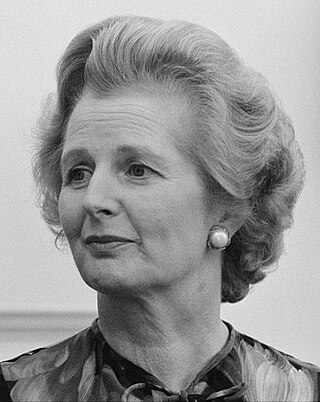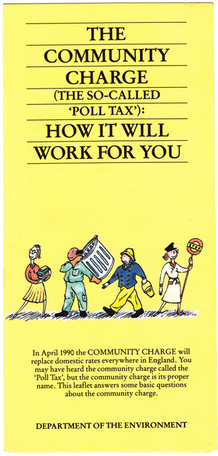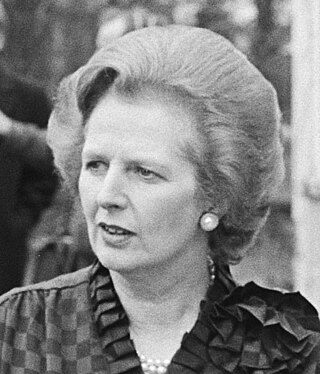
Sir John Major is a British former politician who served as Prime Minister of the United Kingdom and Leader of the Conservative Party from 1990 to 1997. He previously held Cabinet positions under prime minister Margaret Thatcher, the last as Chancellor of the Exchequer from 1989 to 1990. Major was the member of Parliament (MP) for Huntingdon, formerly Huntingdonshire, from 1979 to 2001. Since stepping down as an MP in 2001, Major has focused on writing and his business, sporting and charity work, and has occasionally commented on political developments in the role of an elder statesman.

Margaret Hilda Thatcher, Baroness Thatcher, was a British stateswoman and Conservative politician who served as Prime Minister of the United Kingdom from 1979 to 1990 and Leader of the Conservative Party from 1975 to 1990. She was the longest-serving British prime minister of the 20th century and the first woman to hold the position. As prime minister, she implemented economic policies that became known as Thatcherism. A Soviet journalist dubbed her the "Iron Lady", a nickname that became associated with her uncompromising politics and leadership style.

The 1979 United Kingdom general election was held on Thursday 3 May 1979 to elect 635 members to the House of Commons.

The 1992 United Kingdom general election was held on Thursday 9 April 1992, to elect 651 members to the House of Commons. The election resulted in the fourth consecutive victory for the Conservative Party since 1979, with a majority of 21 and would be the last time that the Conservatives would win an overall majority at a general election until 2015. It was also the last general election to be held on a day which did not coincide with any local elections until 2017. This election result took many by surprise, as opinion polling leading up to the election day had shown a narrow but consistent lead for the Labour Party under leader Neil Kinnock.

Richard Edward Geoffrey Howe, Baron Howe of Aberavon,, known from 1970 to 1992 as Sir Geoffrey Howe, was a British politician who served as Deputy Prime Minister of the United Kingdom from 1989 to 1990. A member of the Conservative Party, he was Margaret Thatcher's longest-serving Cabinet minister, successively holding the posts of chancellor of the Exchequer, foreign secretary, and finally leader of the House of Commons, deputy prime minister and lord president of the Council. His resignation on 1 November 1990 is widely considered to have precipitated the leadership challenge that led to Thatcher's resignation three weeks later.

Sir Malcolm Leslie Rifkind is a British politician who served in the cabinets of Margaret Thatcher and John Major from 1986 to 1997, and most recently as chair of the Intelligence and Security Committee of Parliament from 2010 to 2015. He is also known for his advocacy of a pro-European stance within his party's policies.

The Community Charge, commonly known as the poll tax, was a system of taxation introduced by Margaret Thatcher's government in replacement of domestic rates in Scotland from 1989, prior to its introduction in England and Wales from 1990. It provided for a single flat-rate, per-capita tax on every adult, at a rate set by the local authority. The charge was replaced by Council Tax in 1993, two years after its abolition was announced.
The 1990 Conservative Party leadership election was called on 14 November 1990 following the decision of Michael Heseltine, former defence and environment secretary, to challenge Margaret Thatcher, the incumbent Prime Minister of the United Kingdom, for leadership of the Conservative Party.

The modern political history of the United Kingdom (1979–present) began when Margaret Thatcher gained power in 1979, giving rise to 18 years of Conservative government. Victory in the Falklands War (1982) and the government's strong opposition to trade unions helped lead the Conservative Party to another three terms in government. Thatcher initially pursued monetarist policies and went on to privatise many of Britain's nationalised companies such as British Telecom, British Gas Corporation, British Airways and British Steel Corporation. She kept the National Health Service. The controversial "poll tax" to fund local government was unpopular, and the Conservatives removed Thatcher as Prime Minister in 1990, although Michael Heseltine, the minister who did much to undermine her, did not personally benefit from her being ousted.

The 1981 United Kingdom budget was delivered by Geoffrey Howe, the then Chancellor of the Exchequer, to the House of Commons on 10 March 1981. It was Geoffrey Howe's third budget and the second of the first Thatcher ministry. The budget represented a strongly monetarist response to the stagflation and high government borrowing which the UK was suffering at the time. The budget speech lasted for 91 minutes.

The Gang of 25 or the Group of 25 was a cohort of British Conservative Party backbench members of Parliament (MPs) that threatened to vote against prime minister Margaret Thatcher's 1981 Autumn Statement. The statement contained monetarist measures to control inflation. Similar measures introduced since 1979 had reduced inflation but caused job losses in the manufacturing sector.

Liz Truss's tenure as Prime Minister of the United Kingdom began on 6 September 2022 when she accepted an invitation from Queen Elizabeth II to form a government, succeeding Boris Johnson, and ended 50 days later on 25 October upon her resignation. As prime minister, Truss served simultaneously as First Lord of the Treasury, Minister for the Civil Service, and Minister for the Union.

On 23 September 2022, the Chancellor of the Exchequer, Kwasi Kwarteng, delivered a Ministerial Statement entitled "The Growth Plan" to the House of Commons. Widely referred to in the media as a mini-budget, it contained a set of economic policies and tax cuts such as bringing forward the planned cut in the basic rate of income tax from 20% to 19%; abolishing the highest (45%) rate of income tax in England, Wales and Northern Ireland; reversing a plan announced in March 2021 to increase corporation tax from 19% to 25% from April 2023; reversing the April 2022 increase in National Insurance; and cancelling the proposed Health and Social Care Levy. Following widespread negative response to the mini-budget, the planned abolition of the 45% tax rate was reversed 10 days later, while plans to cancel the increase in corporation tax were reversed 21 days later.

The 1988 United Kingdom budget was delivered by Nigel Lawson, the Chancellor of the Exchequer, to the House of Commons on 15 March 1988. It was the fifth budget to be delivered by Lawson during his tenure as Chancellor, and marked major changes to taxation, with reductions in income tax and changes to inheritance tax rules, as well as changes to mortgage interest relief that prevented homebuyers from being able to pool mortgage allowances. The changes announced to mortgage relief ultimately helped to further fuel an ongoing property boom which led to a rise in inflation and an increase in interest rates. Due to frequent disruptions during the Chancellor's speech, Deputy Speaker Harold Walker was required to suspend proceedings in what was described as an outbreak of "grave disorder".

The 1989 United Kingdom budget was delivered by Nigel Lawson, the Chancellor of the Exchequer, to the House of Commons on 14 March 1989. It was the sixth and final budget to be presented by Lawson during his tenure as Chancellor, and took a much more cautious approach to the UK economy than previous budgets delivered by Lawson. It was outlined against the back drop of mounting economic turbulence with increasing interest rates and rising inflation. 1989 was also the final pre-television era budget to be presented to the House of Commons.

The 1997 United Kingdom budget was delivered by Gordon Brown, the Chancellor of the Exchequer, to the House of Commons on 2 July 1997. It was the first budget to be presented by Brown during his tenure as Chancellor, and the first Labour budget to be presented since April 1979. The 1997 budget marked a significant change of direction in economic policy following Labour's election win in May 1997. Among the measures announced were a five-year plan to reduce the budget deficit, a £5.2bn windfall tax on recently privatised utilities which was to fund Labour's planned Welfare to Work scheme, and a reduction in VAT on fuel. The budget was welcomed by business, which viewed it as fiscally responsible, but it was greeted less warmly by the UK's utility providers.

The 1995 United Kingdom budget was delivered by Kenneth Clarke, the Chancellor of the Exchequer, to the House of Commons on 28 November 1995. It was Clarke's third budget, and one of the shortest budget speeches in modern history. In his statement, Clarke reduced the middle rate of income tax by 1p to 24p, and after announcing that his spending reductions for the previous year had exceeded expectations by more than £3bn, announced plans to increase spending on healthcare, education and policing. His budget was criticised by members of the Conservative Party for not including more tax cuts, while Shadow Chancellor Gordon Brown of the Labour Party dismissed it as "the 7p up, 1p down budget".

The 1994 United Kingdom budget was delivered by Kenneth Clarke, the Chancellor of the Exchequer, to the House of Commons on 29 November 1994. It was the second budget to be presented by Clarke since his appointment as chancellor the previous year, and its central focus was a planned £24bn worth of tax cuts. Clarke also renewed his commitment to increasing Value Added Tax (VAT) on fuel, but pledged to soften the impact this would have on pensioners. The statement took place shortly after the Party Whip had been withdrawn from eight Conservative backbenchers, leaving the government without a working majority, and amid questions about the future of John Major's leadership of the party. In response to the budget, Tony Blair, leader of the Labour Party, said it would be remembered as the "VAT on fuel budget".

The 1991 United Kingdom budget was delivered by Norman Lamont, the Chancellor of the Exchequer, to the House of Commons on 19 March 1991. It was Lamont's inaugural budget following his appointment as chancellor by Prime Minister John Major, and the first to be presented following the resignation of Margaret Thatcher as Prime Minister the previous autumn.

The 1982 United Kingdom budget was delivered by Geoffrey Howe, the Chancellor of the Exchequer, to the House of Commons on 9 March 1982. This was the fourth budget to be presented by Howe during his tenure as chancellor, and came at a time when unemployment had reached three million and the governing Conservative Party were unpopular in opinion polls. Howe painted a bleak picture of the UK economy and outlined a fairly neutral budget. As well as drawing criticism from the Leader of the Opposition, the statement was also condemned by the Conservative MP Ian Gilmour, who had advocated a reflation package worth £5bn. The budget was presented a few weeks before the Falklands War, an event that was to revive the Conservatives' fortunes.














